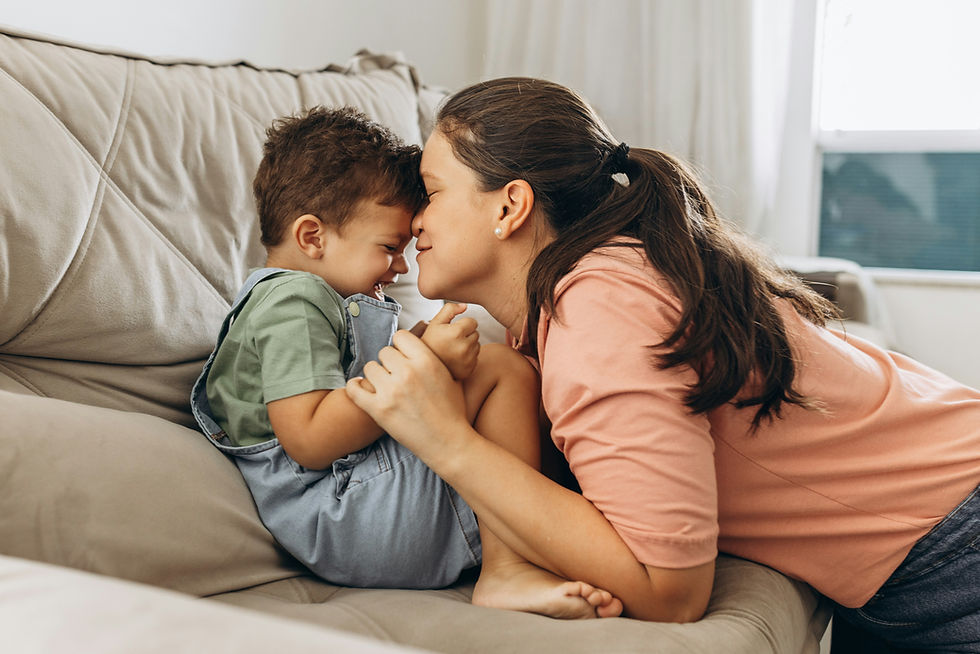Abi's Story: Raising a toddler in non-native Spanish
- alicegray

- Jun 23, 2022
- 3 min read

Abi speaks mostly Spanish with her 2-year-old daughter, Amal. And it shows; Amal responds to and understands Spanish perfectly and even babbles and sings in Spanish. And yet, Abi is not a native Spanish speaker.
We wanted to know how Abi had established such a solid base in Spanish for Amal, and what role Mi Casa Es Tu Casa® played, so we asked her to coffee to talk about it.
In our interview, she shared her approach to languages and parenting, stuff every new parent with a goal of raising a bilingual child should know!
I also learned that Amal is actually trilingual since her father speaks to her in Bengali. ❤️
What’s your main motivation for doing Mi Casa Es Tu Casa® with Amal?
"It’s a fun activity to do together in Spanish," she said quickly, as if to say, who wouldn't want to do it?!
“In that order?” I asked
Abi thought about it and said that the thing Mi Casa Es To Casa® gives them that they don't get anywhere else is the opportunity for Amal to socialize IN Spanish and make physical connections with the language.
These classes, where they've been coming since Amal was 6 months old, are a rare opportunity for Amal to interact with others and do activities where she is producing music, language, and movement related to the Spanish she's learning.
Abi went on to point out that her own Spanish has improved with Mi Casa Es Tu Casa®. Just a few weeks ago, for example, she used vocabulary she had learned from the song Hortelana (from our Familia collection) when she was out planting a garden with Amal.
Abi and Amal do more than just visit our studio for class once a week. They also have our At-home Spanish Music Program membership where they can dance and sing in Spanish on their own schedule from their own living room.

When do you and Amal do the video classes through the At-home Program?
"We do them almost every day," she said, and then added "we love them."
"How do you manage to squeeze in a class every day?" I asked, impressed.
But to Abi it was easy. There are certain times of day that trigger their Spanish music activity:
If they go to the park, when they get home they often do a class.
When Amal takes a bath in the evening, if there's more time before bed, they'll sit down to do a class.
And Amal can ask for songs from class both with words and with hand motions (the American Sign Language we integrate into our program). Don Alfredo and Chuchuwa are two of her favorites right now.
Here they are following along and singing our Buenos Días song together:
Following Amal's lead and keeping it pressure-free
Abi follows her daughter's lead for which class they want to do. They will often watch the very same class video a few days in a row, because that’s what Amal likes to do and Abi knows that repetition is good for her language learning.
As Amal has gotten older her attention span for the classes has grown and so has her participation. When she was smaller, she used to just observe and kind of go back and forth between watching the video and watching her mom do all the movements and singing. Sometimes she might join in, but then often she would just get up and wander away when she was done.
But Abi pointed out that this is how she is with anything (like books & toys) and the older she gets, the longer she’s able to focus.
The class videos are not the only way that they engage with the songs from home. They always listen to the music on their Mi Casa Es Tu Casa® app at mealtimes. This is an important habit they've established because Abi has noticed that Amal is more engaged in class (in person & at home) when she knows the songs.
"Amal," Abi said thoughtfully, "was humming these songs before she was speaking sentences."

Abi's story

Abi has a background in clinical counseling with a master's in social work, which has deepened her journey with both Spanish and human psychology.
You might not have advanced (or even basic) Spanish like Abi. But anyone can follow her lead by integrating Spanish and music into family life around daily habits and routines and by seeking out community and human interaction in Spanish.
As a personal development coach, Abi has neuroscience-based wisdom to impart, and we admire her work just as much as we admire her parenting. You can follow her on instagram @theexistentialcoach, or read about her workshops and individual coaching on her website: theexistentialcoach.com.
Serious about having your baby or toddler learn Spanish? Join us in-person in Austin, Texas. Or, join our At-home Spanish Music program from anywhere in the world.






Comments